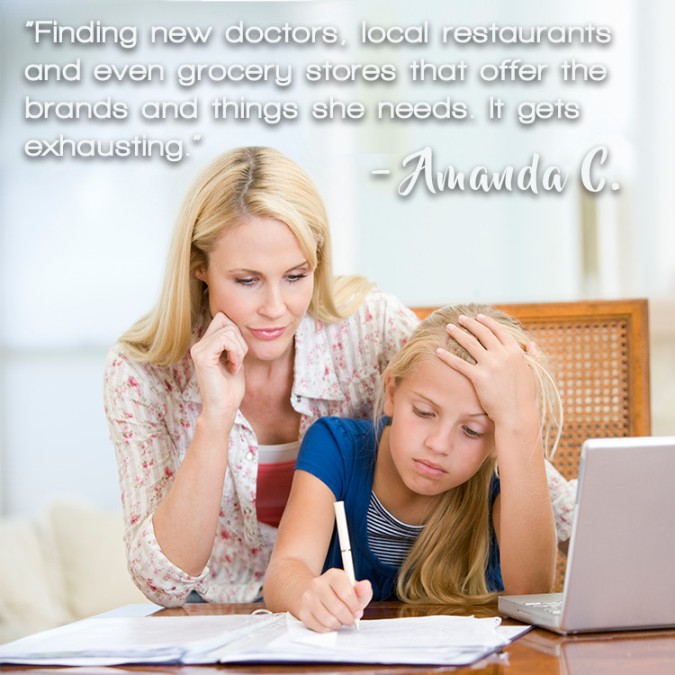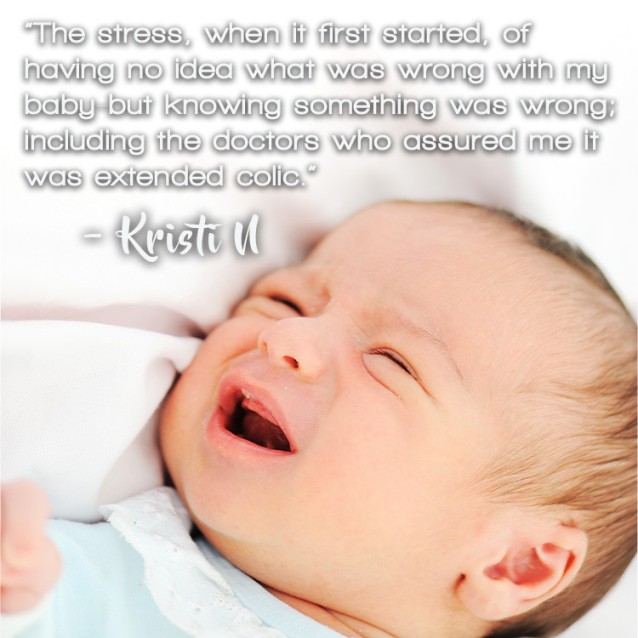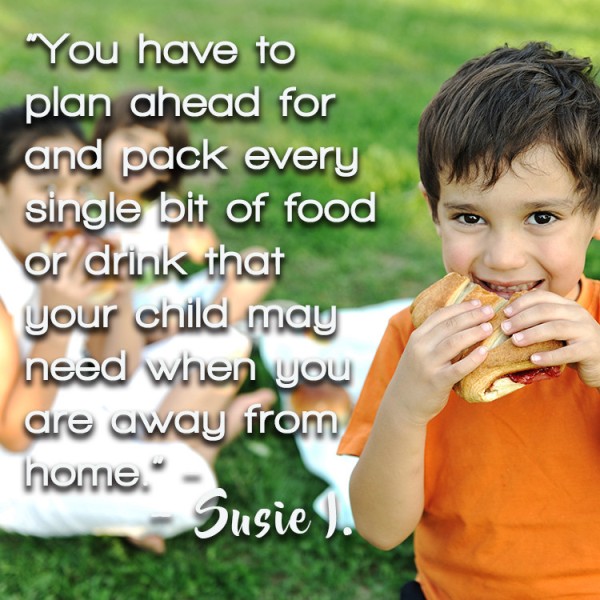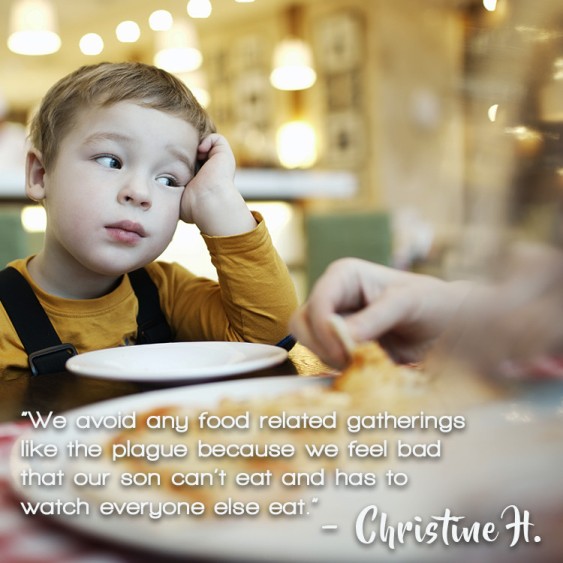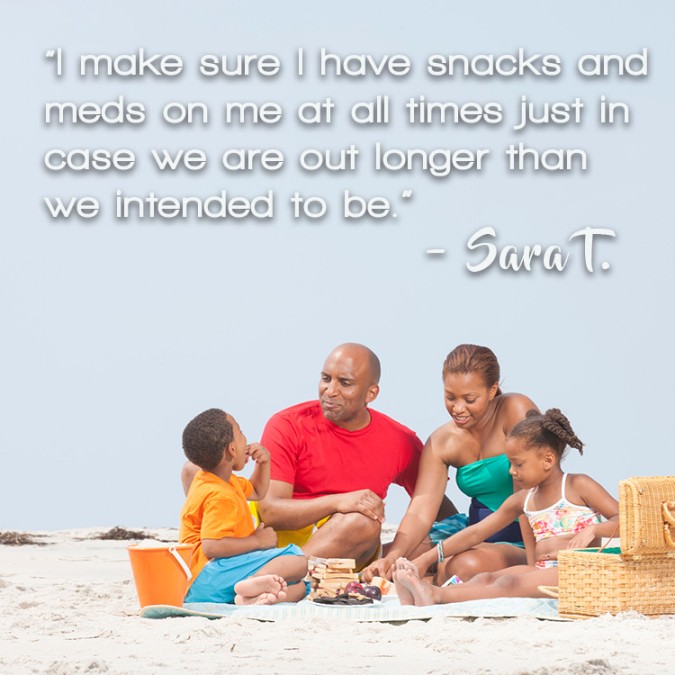33 Things Parents Do When They Have a Child With FPIES
Food-protein induced enterocolitis syndrome (FPIES) is a type of food allergy. FPIES is a delayed food allergy of the gastrointestinal system, which means a reaction may not happen until hours after a trigger food exposure. FPIES is most often diagnosed in infants and young children although school age children and some adults are living with this rare type of food allergy. Someone living with FPIES may react to one or two foods and some may have multiple food protein “triggers.” There are not medical tests that can determine which foods will trigger a reaction. The only way to know if a food is safe to include in the diet is through food trials.
A diagnosis of FPIES can be life-altering. It changes the way a parent approaches food introductions with their baby and influences the way the family views food – at home and in social settings. A parent learns to be acutely aware of potential food allergy exposures in all aspects of the day’s activities.
Sharing from the FPIES community, these are some of the things parents of children living with FPIES are doing because of the diagnosis that other people may not realize.
1. “FPIES isn’t a diagnosis for us, it’s an island. We live on this island isolated from family, friends and the community. We aren’t ‘anti-social.’ We would love to be at the next graduation party, BBQ, birthday party…but the risk is too great and the stress level too high for us to attend. So when we say, ‘Please stop and see us! Please come visit anytime!’ we aren’t being polite, we truly want company.” – Alliyson F.
2. “Thankfully our FPIES journey ended at 22 months; but when our first daughter had FPIES to dairy, soy, rice and oats, if we were visiting family or friends or a function, I would scan floors and surfaces looking for stray grains of rice, etc… Everyone hated it because they thought I was judging their cleanliness, especially when I was down on all fours picking up microscopic pieces of crumbs. I got told so many times I was creating the allergy by not letting her have small amounts of these foods. Unless you are an FPIES/allergy parent you just don’t get it.” – Louise B
3. “My daughter is 8 and still living with FPIES. We move a lot due to my husband’s job about every two to three years. I constantly have to research the areas we live. Finding new doctors, local restaurants and even grocery stores that offer the brands and things she needs. It gets exhausting.” – Amanda C.
4. “Wipe all the children’s hands and faces before the kids sit down to the shared morning tea I’ve provided. I’m sure their parents think I’m a germaphobe – but I’m a banana-phobe.” – Kellie L.
5. “I am still in the breastfeeding stage. My little one is 4 months and reacting through my breast milk. I donate most of the milk I end up pumping because unless I know it’s 100 percent safe (and getting to a baseline has been a real struggle for me) I don’t keep it.” – Nicole K.
6. “Making sure my son knows not to take food from strangers, other kids or anyone really unless I say it’s OK. He does a really good job of this since before I think he even realized it. Turning down foods shouldn’t be a sad thing, everyone always feels bad. I’m proud that he doesn’t make a big deal about it. There are plenty of foods he loves that are safe for him!” – Nicole B.
7. “Continuously learning the science and chemistry of food to make a better brownie or chocolate chip cookie or pancake or (fill in the blank) because with all the substitutions needed, they’re never quite as good or stay good for long, and he knows it even though he’s never had the real thing.” – Toni K.
8. “Every time my kids try a new food, my husband and I check our watches for the time. My kids both react at two hours post ingestion, and we always make sure to be home by then. When they make it past that, we do a little family happy dance.” – Carlee H.
9. “The stress, when it first started, of having no idea what was wrong with my baby, but knowing something was wrong – including the doctors who assured me it was extended colic.” – Kristi N.
10. “For every single newish food, waiting the two-hour mark for a reaction, wiping down and cleaning everything all the time, making everything from scratch with minimal ingredients to recreate typical foods, dreading each challenge where she has to be hooked up to an IV where you have to keep feeding her even though she might go into shock.” – Ilene C.
11. “I don’t let my son go fishing (his trigger is fish) because I can’t take the chance that something silly will happen and he’ll get sick.” – Nicole O.
12. “I give safe snacks to other kids (after asking their parents) so they don’t eat or share unsafe snacks with my little one.” – Hillary M.
13. “Checking labels on every box, package and bag – even ones that have been safe in the past.” – Heidi I.
14. “I always check if other children have allergies before offering food.” – Jane R.
15. “Helicopter parenting! It’s not a choice, it’s necessary to keep my son safe.” – Lauren B.
16. “We bought a camper for vacations so we can always have our kitchen and make our own food.” – Sara S.
17. “Pack a diaper bag for my almost 4-year-old so she has safe water and food wherever we go.” – Arathi C.
18. “We take our own food and milk wherever we go, even when traveling to another country!!” – Obone P.
19. “I don’t share food or drinks (even water) with my kids. Ever. I can’t take the risk of cross-contamination.” – Melissa M.
20. “We use wet wipes and wash our hands like it’s our religion.” – Ananda C.
21. “Bring little one’s food into food places with us (she’s old enough to eat anywhere we go).” – Mary W.
22. “Leave the park when we see kids eating on the play equipment.” – Jessie C.
23. “I work really hard so my son can experience a variety of fun foods. It looks like he’s eating ice cream, like a normal kid, but first I had to buy an ice cream machine, research recipes that might possibly work with his few safe foods, make a pudding out of his rice milk with flour and sugar, then cool it overnight and make the ice cream myself. Same with his bread. Same with his waffles. Same with his cookies. It’s important to me that he not miss out on what other kids are doing just because of the hand he was dealt.” – Janie D.
24. “It takes a lot of extra work, but it’s worth it. I remember making goat’s milk yogurt for my son (he is 34 now). Only thing was the other three kids liked it too – so I was always making another batch. Then his tonsillitis attacks started. With some help from a naturopath, he didn’t have to have his tonsils out. But he had to give up milk entirely.” – Dianne P.
25. “When you have FPIES to corn and multiple other foods, you can never go out to eat. No McDonald’s on a busy day, no pizza or hotdogs at a sports event. There is no stopping at a gas station for a snack on the road. You have to plan ahead for and pack every single bit of food or drink your child may need when you are away from home.” – Susie I.
26. “I think the biggest thing that people don’t realize is the pure joy and relief I feel when I find my 2-year-old son a new safe food. That look on his face when he tries something new and says “yummy,” that’s just priceless…the happiness I feel when he has a good day and can eat until his belly is full, when I know for sure that he can’t be hungry anymore, I can sit back and breathe. And then there is the pain I feel when he loves a new food and it turns out to be a trigger and he can’t have it anymore. People don’t realize the impact on pretty much every aspect of your family life.” – Anouk F.
27. “We take nothing for granted. Our health, the ability to eat at a restaurant, grocery shopping, play dates, a fun park or playground adventure, vacations, birthday parties, school functions and holidays. Every time we leave the house, we risk our son’s health. Every time we leave him with a caregiver, it is an exercise in trust and clear communication. This syndrome is fearful isolation, and we will never take normal life for granted again.” – Carrie S.
28. “Our youngest has outgrown her FPIES now, but she reacted to all grains, rice being the worst reaction. So we didn’t let our girls play with play dough, anywhere, let alone have any in the house, so there couldn’t be any risk of her putting it in her mouth and ingesting even the tiniest amount. We also limited our outings and play dates because it was so exhausting staying vigilant every moment – there was one day when we went to a friend’s house and her kids were playing with a rice sensory tub with some having ended up on the floor. I broke out in a cold sweat and nearly burst into tears trying to figure out how to clean things up and keep my little one out of harm’s way.” – Kim B.
29. “I take a Rubbermaid container and fill it with safe snacks and give it to the teacher to keep in class at the beginning of the school year. This way when someone brings birthday treats she doesn’t feel left out. A lot of the time the teachers do popcorn and movie Friday so I keep safe popcorn in her buckets for her as well. I usually do popcorn, cookies and ring pops so she has a variety.” – Amanda C.
30. “We never go out to eat because of the FPIES and severe IgE/ANA allergies. We go to the same resort for vacation every year because it’s close to home, under an hour away and has a kitchen. We avoid any food-related gatherings like the plague because we feel bad that our son can’t eat and has to watch everyone else eat.” – Christine M.
31. “Leave anywhere immediately if someone appears sick with snot or a cough…snot means my son won’t drink his formula that he already barely drinks. Being sick also means we can’t continue trialing new food.” – Skylar R.
32. “I use a cover for restaurant high chairs and shopping carts. I can’t risk exposure to dust from oats or rice.” – Susan W.
33. “I make sure I have snacks and meds on me at all times just in case we are out longer than we intended to be.” – Sara T.
Thinkstock photo via Liderina.


